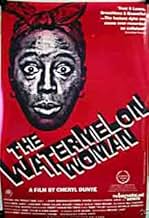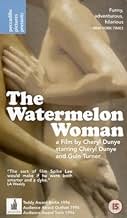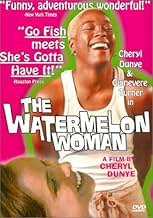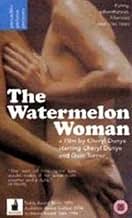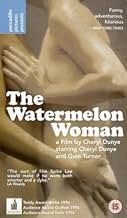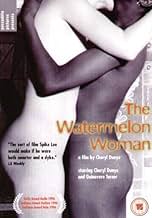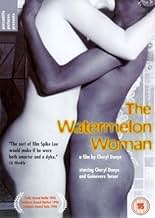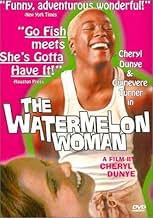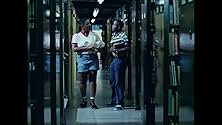VALUTAZIONE IMDb
7,1/10
4372
LA TUA VALUTAZIONE
Una regista lesbica nera indaga nella vita della Watermelon Woman, un'attrice nera degli anni trenta che interpretava gli archetipi della "mama".Una regista lesbica nera indaga nella vita della Watermelon Woman, un'attrice nera degli anni trenta che interpretava gli archetipi della "mama".Una regista lesbica nera indaga nella vita della Watermelon Woman, un'attrice nera degli anni trenta che interpretava gli archetipi della "mama".
- Regia
- Sceneggiatura
- Star
- Premi
- 4 vittorie totali
Cheryl Clarke
- June Walker
- (as Cheryl Clark)
Kat L Robertson
- Yvette
- (as a different name)
Recensioni in evidenza
When we first see clips of old film actor Fae Richards, the person the protagonist (Cheryl Dunye) is researching, it's immediately apparent that she's fictional, and I initially thought it was an unfortunate choice. But as it played out, it hit me: what does it say when a black lesbian director invents this person, and the researcher has a hard time finding information on her? Probably that there simply was not adequate representation, and that history is usually whitewashed. At the end of the credits, the line "Sometimes you have to create your own history" gave me goosebumps. Along the way there are things on the surface that will undoubtedly draw reactions - the wildly uneven acting and indie production value, and a sex scene that seemed restrained and erotic to me but which unfortunately drew the ire of conservatives in Congress. Aside from the representation the film gives us, it's filled with things that critique the world this woman lives in. There's the obvious barb in the fictional actor being dubbed "Watermelon Woman" and being famous for her role in "Plantation Memories." Another is the librarian explaining to her that she should check the "black reference" files for the old film star, and the silent little look she exchanges with her friend. There's also the white film professor explaining how modern black scholars have it wrong relative to the offensiveness of the "mammy" figure, which was brilliant. It comes within the community too; when her friend frowns upon the relationship she's having with a white woman, she says it's nobody's business who she's having sex with. Amen. Despite the choppiness of a few scenes which almost seem like parodies of themselves, I genuinely enjoyed this film. It's creative, empowering, and well-paced in its 85 minutes. There's also something pretty powerful about the message at its center.
There are hundreds upon thousands of lesbian movies, and the majority are labelled "Adult". Name one lesbian movie about black women that isn't pornographic? Watching this one was something I could relate to. Finally, a movie touching on black history, interracial attraction, stereotypes, and the fictional day-in-the-life of an aspiring film-maker. More original than most, speaking as a black woman. Excuse the bad technology, and you've got a story about a woman researching her black history and getting laid in the process! Maybe she couldn't get the rights to do "The Aunt Jemima Story". You know, that black maid who's face stared back at you from the pancake box, having gone through a few make-overs through the years? There's even a scene where Cheryl holds up movie stills of black actresses playing the usual slave/maid who become unknowns in the process. Well, this is one important movie for me, and I hope more people appreciate this as they listen to Cheryl's closing monologue. Now this movie deserves a remake!
6/10
6/10
'The Watermelon Woman (1996)' is the first film to be directed by a Black lesbian filmmaker, which is hard to believe considering it came out in the late 90s. Blurring the line between fact and fiction, the feature alternates between footage supposedly shot for a documentary director Cheryl Dunye is shooting about the eponymous old Hollywood actor and narrative segments filmed with more traditional methods. The on-screen story seems to replicate the real-life story, presenting as a fictionalised version of events that must have happened prior to/ happened during production, but it's actually all carefully crafted to have this effect. That's because the entirety of the affair is fiction, an experiment designed to seem like a genuine documentary that pulls its maker into its orbit and reflects their personal journey in traditional interludes. The documentary we see is being made by Cheryl Dunye the character, but not by Cheryl Dunye the filmmaker. I already knew this going in, but I can imagine it being mind-blowing to anyone who isn't aware. That's because each and every documentary segment is crafted with such authenticity, such perfect imperfectness, such true-to-life inexperience that it feels wholly believable. Every single person who is interviewed is acting, whether they know it or not (perhaps the street interviews are real; I can't tell), and they turn in almost accidentally masterful performances. I mean, this is how you work with an amateur cast; use their rawness to your advantage, craft situations in which it's beneficial for them not to be professional and flawless and recognisable. Perhaps the acting in the definite fiction segments could have been improved from time to time, but even the occasional flubbed line or strained delivery in these sections reinforces the idea that they're being created by a bunch of the director's friends as experimental companion pieces to the documentary. The whole feature feels like a personal essay from its director, something speaking directly to you as you watch it, and it's really impressive that it feels this genuine and homemade when it's actually a meticulously crafted affair. It deals with themes of race and sexuality and representation, exploring interracial relationships (and the stigmas and stereotypes that come with them), the evolving role of women - in particular, Black women - in Hollywood (and how certain stereotypes can be important stepping stones despite being harmful overall), LGBTQIA+ filmmaking and socialising, and the concept that you have to be the change you want to see. The underlying thesis seems to be that if you want to see something represented on screen, you should make something that represents it on screen. That's exactly what Dunye has done, putting what are clearly very important aspects of her identity on display in a way that feels both vulnerable and powerful all at once. Empowerment seems to be the name of the game here, and the fantasy of the filmmaker being able to locate an idol who was living (something close to) her reality all those years earlier isn't used as a way to remind us that these things aren't as common as they should be, but instead to inspire us that one day we might be able to find real Watermelon Women in our own media. Movies like this pave the way in making that possible; the next Cheryl Dunye won't be looking at problematic Hollywood pictures to see themselves reflected in film, they'll be looking at her. This is one of those movies that it just isn't especially helpful to rate. It isn't the most exciting or engaging in-the-moment experience, but it's an incredibly rewarding one in retrospect. The more I think about it, the more I like it. It's occasionally funny, occasionally romantic, and consistently so real that it's hard to believe it's not (even if some elements of reality definitely seep into it). It's an important indie film that impresses thematically, formally and representationally, a vibrant and powerful effort that reminds you how unique and potent and inspiring movies can be. It's the kind of thing that makes you want to just grab a camera and make something. It's pretty great.
This is a very lighthearted film about a black video store clerk (Cheryl Dunye) who wants to make a documentary about an early black actress, known only as The Watermelon Woman." The fact that both Cheryl (Dunye) and the actress are lesbians keeps her going. In fact, in life imitating art, Cheryl finds that The Watermelon Woman was having a lesbian relationship with a white director, and then, she begins a relationship with a white video store customer (Guinevere Turner - American Psycho, Itty Bitty Titty Committee).
The film explored black language, early black actresses, black lesbians, mammies, and watermelon. It even featured an interview with Camille Paglia discussing mammies and watermelon in the context of blacks and Italians, It's nice to see Italians spoken of in something other than the Mob.
Her BFF Tamera (Valarie Walker) is a party girl, but she draws the line at interracial relationships, and that causes a problem for Cheryl.
There are a lot of good scenes throughout the movie, and it made it worthwhile even if the acting wasn't particularly good.
The end credits will surprise you.
The film explored black language, early black actresses, black lesbians, mammies, and watermelon. It even featured an interview with Camille Paglia discussing mammies and watermelon in the context of blacks and Italians, It's nice to see Italians spoken of in something other than the Mob.
Her BFF Tamera (Valarie Walker) is a party girl, but she draws the line at interracial relationships, and that causes a problem for Cheryl.
There are a lot of good scenes throughout the movie, and it made it worthwhile even if the acting wasn't particularly good.
The end credits will surprise you.
The Watermelon Woman (1996) -
I suppose that as a homosexual white British man, I probably wasn't exactly the target audience for this Black, Lesbian film from the U. S., although that in itself goes against my belief that people should explore genres out of their comfort zone, because otherwise they will never know if there is more to life. I could certainly see the appeal of this one for some and the message it was trying to get out. I just didn't like the sex scenes very much (Eek Boobies!).
For the most part, the story was fictionalised and the title character of "The Watermelon Woman" was a vehicle to discuss the injustices of racial bigotry in the world of cinema since the dawn of it's creation and to a certain extent the rest of the time since too.
Although this film did indicate some essence of racism towards white people, for the fact that they allegedly can't understand the persecutions faced by the black community and I wondered if that was deliberate or something that was a missed irony.
The lead character Cheryl played by the writer and director Cheryl Dunye wanted to track down the movements of The Watermelon Woman's past to find out what had happened to her and she studied the golden age of cinema in order to do so. Her journey was quite interesting. I did have to wonder if the whole film might have actually been better if it was presented as a documentary, about actual, real actors of the past that weren't given their dues accordingly.
There was a mention of Hattie McDaniel included here. She was famously snubbed at the Oscars when she went to receive her award for the part of Mammy in 'Gone With The Wind' (1939) and was made to sit in another room and only allowed to enter the main area for the presentation of her statue. Her story was partly covered in the TV series 'Hollywood' (2020) and I'm sure that wasn't delivered wholeheartedly or completely truthfully, because it was a very glamourised interpretation of the early years of Hollywood anyway and it dared to conceive an idea that perhaps these prejudices and things should have been exposed much earlier for their idiocy.
I did say that it might have worked better as a documentary, because I could see that Cheryl was obviously passionate about her message, but the acting really wasn't the best and the film quality was quite poor too, not even just the bits where it was filmed on an old video camera. There were some cheap and odd editing choices and many of the characters were a tad unfriendly while others were perfectly odd including the "Professor" and the C. L. I. T. volunteer (Sarah Schulman).
The style of it actually reminded me of 'Tangerine' (2015), a trans/drag film which was filmed entirely on a smart phone. There were similarities in the direction and the attempt at realism, but this film was far less obnoxious of course, because 'Tangerine' was vile.
It also had a hint of 'Not Another Gay Movie' (2006) too. Those producers, etc must surely have taken inspiration from this film, because the video shop was almost identical.
Not really my thing, but I would definitely recommend it to the appropriate people, because I know some that would appreciate it for its various plus points.
606.19/1000.
I suppose that as a homosexual white British man, I probably wasn't exactly the target audience for this Black, Lesbian film from the U. S., although that in itself goes against my belief that people should explore genres out of their comfort zone, because otherwise they will never know if there is more to life. I could certainly see the appeal of this one for some and the message it was trying to get out. I just didn't like the sex scenes very much (Eek Boobies!).
For the most part, the story was fictionalised and the title character of "The Watermelon Woman" was a vehicle to discuss the injustices of racial bigotry in the world of cinema since the dawn of it's creation and to a certain extent the rest of the time since too.
Although this film did indicate some essence of racism towards white people, for the fact that they allegedly can't understand the persecutions faced by the black community and I wondered if that was deliberate or something that was a missed irony.
The lead character Cheryl played by the writer and director Cheryl Dunye wanted to track down the movements of The Watermelon Woman's past to find out what had happened to her and she studied the golden age of cinema in order to do so. Her journey was quite interesting. I did have to wonder if the whole film might have actually been better if it was presented as a documentary, about actual, real actors of the past that weren't given their dues accordingly.
There was a mention of Hattie McDaniel included here. She was famously snubbed at the Oscars when she went to receive her award for the part of Mammy in 'Gone With The Wind' (1939) and was made to sit in another room and only allowed to enter the main area for the presentation of her statue. Her story was partly covered in the TV series 'Hollywood' (2020) and I'm sure that wasn't delivered wholeheartedly or completely truthfully, because it was a very glamourised interpretation of the early years of Hollywood anyway and it dared to conceive an idea that perhaps these prejudices and things should have been exposed much earlier for their idiocy.
I did say that it might have worked better as a documentary, because I could see that Cheryl was obviously passionate about her message, but the acting really wasn't the best and the film quality was quite poor too, not even just the bits where it was filmed on an old video camera. There were some cheap and odd editing choices and many of the characters were a tad unfriendly while others were perfectly odd including the "Professor" and the C. L. I. T. volunteer (Sarah Schulman).
The style of it actually reminded me of 'Tangerine' (2015), a trans/drag film which was filmed entirely on a smart phone. There were similarities in the direction and the attempt at realism, but this film was far less obnoxious of course, because 'Tangerine' was vile.
It also had a hint of 'Not Another Gay Movie' (2006) too. Those producers, etc must surely have taken inspiration from this film, because the video shop was almost identical.
Not really my thing, but I would definitely recommend it to the appropriate people, because I know some that would appreciate it for its various plus points.
606.19/1000.
Lo sapevi?
- QuizAccording to writer/director Cheryl Dunye, much about the character she plays in the film is autobiographical, but the historical references to the Watermelon Woman are fictional: "The Watermelon Woman came from the real lack of any information about the lesbian and film history of African-American women. Since it wasn't happening, I invented it."
- BlooperCheryl (Cheryl Dunye) appears to make a slight fluff of her lines during a dinner scene with Diana, Tamara and Stacey, saying: "Anyway, Diana, if you came to Philadelphia to shape... escape the cold Chicago winters..."
However, as the dinner conversation is deliberately uncomfortable, this is possibly intended.
- Curiosità sui creditiThe film, which seems to be a documentary about Cheryl's search for the obscure actress who inspired her, ends with these printed words: "Sometimes you have to create your own history. The Watermelon Woman is fiction. Cheryl Dunye, 1996"
- Versioni alternativeIn 2016, director Cheryl Dunye's landmark Black Queer Film THE WATERMELON WOMAN was re-released in select theaters and festivals with a pristine 2K HD restoration overseen by the production company 13th Gen, in partnership with Modern Videofilm. The restoration and re-release was sponsored by First Run Features, the Outfest UCLA Legacy Project, and the Toronto International Film Festival. This theatrical tour will be followed by a DVD re-release in early 2017.
- ConnessioniFeatured in Fabulous! The Story of Queer Cinema (2006)
I più visti
Accedi per valutare e creare un elenco di titoli salvati per ottenere consigli personalizzati
- How long is The Watermelon Woman?Powered by Alexa
Dettagli
Botteghino
- Budget
- 300.000 USD (previsto)
- Lordo Stati Uniti e Canada
- 1989 USD
- Fine settimana di apertura Stati Uniti e Canada
- 774 USD
- 13 nov 2016
- Lordo in tutto il mondo
- 1989 USD
- Tempo di esecuzione1 ora 25 minuti
- Colore
Contribuisci a questa pagina
Suggerisci una modifica o aggiungi i contenuti mancanti

Divario superiore
By what name was The Watermelon Woman (1996) officially released in India in English?
Rispondi



